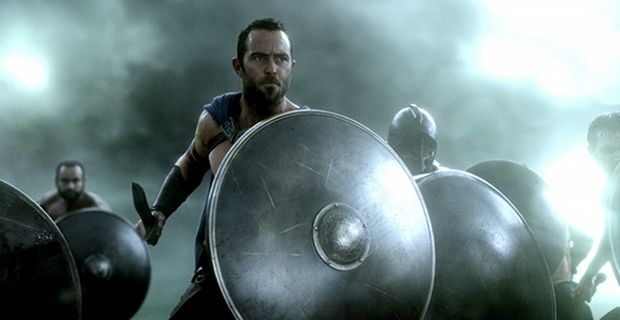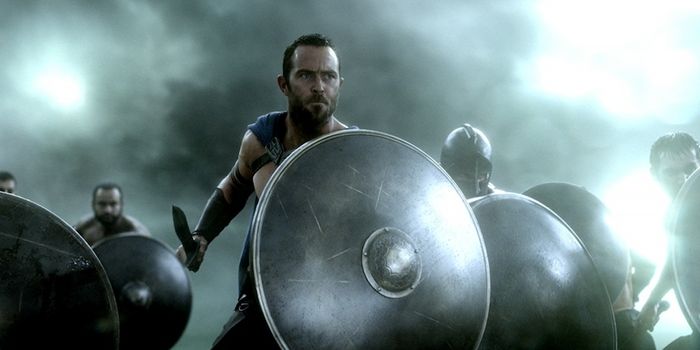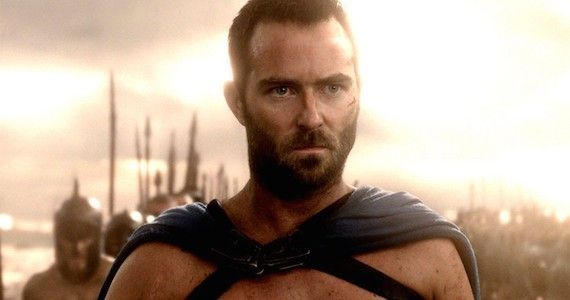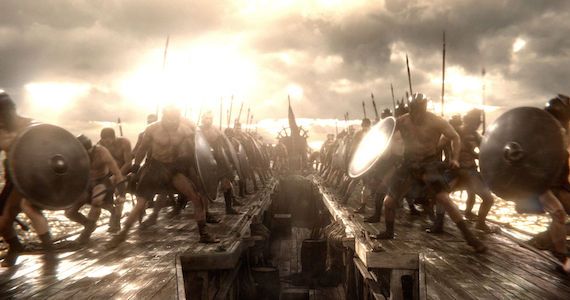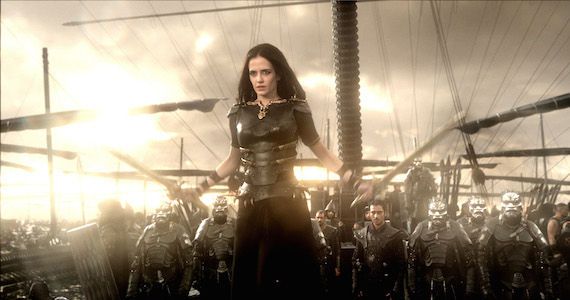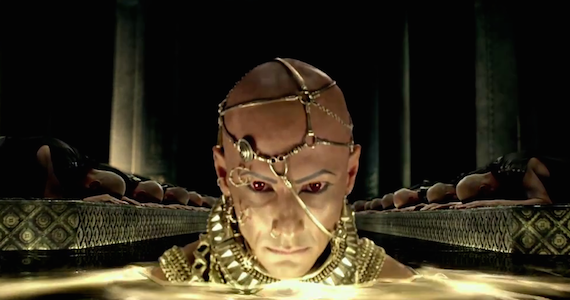It may not court casual moviegoers as easily as its predecessor, but Murro succeeds at delivering a 300 sequel that fans will enjoy watching.
The 300: Rise of an Empire story follows Athenian general Themistocles (Sullivan Stapleton) in the Battle of Artemisium - while interweaving with the events of 300 (i.e., the Battle of Thermopylae). During the first attempted invasion of Greece by the Persian empire, Themistocles and his army successfully defend the Greek shoreline in the Battle of Marathon - mortally wounding King Darius I (Yigal Naor), father of Xerxes (Rodrigo Santoro) and mentor to the ruthless Artemisia (Eva Greene).
As the king is dying, Artemisia formulates a plan to seek revenge on the Greeks by turning the naive (and cowardly) Prince Xerxes into a God-like figure for the Persian Empire to rally behind. Ten years later, Xerxes return with a devastating invasion force - engaging King Leonidas and his Spartan warriors on land at the Hot Gates, while Artemisia battles Themistocles and the Greek navy at sea. Like the 300, Themistocles is gravely outnumbered - forced to rely on cunning and the strength of a unified Greece if he hopes to once again defend his homeland and drive back the invading Persians.
300: Rise of an Empire arrives eight years after Zack Snyder's original 300 wowed audiences with slick slow-motion fight sequences, an illustrative visual aesthetic, and an intriguing fantasy tale variation on the real-life Battle of Thermopylae. Snyder returns as executive producer but handed directorial duties over to Noam Murro (Smart People), who does his best to imitate the 300 formula but falls short of doing anything new or particularly memorable in the process. In general, it's an adequate follow-up, packed with action, machismo, over-the-top violence, and fantastic twists on actual events - but nearly every single element is slightly inferior to Snyder's original vision and execution. Fans of the original will, likely, enjoy returning to Frank Miller's exaggerated version of Greek history; yet, 300: Rise of an Empire doesn't offer the same cross-genre appeal as its predecessor.
The main plot is serviceable, jumping in and out of scenes previously seen in 300 to help flesh out the larger war with Xerxes, as well as the backstories of Artemisia and Themistocles. Familiar supporting characters - like Queen Gorgo (Lena Headey) and Dilios (David Wenham) - return to connect Rise of an Empire to the prior installment, but viewers shouldn't expect to spend a lot of time with the Spartans, as the sequel is tightly centered on the conflict between Artemisia and Themistocles.
Frank Miller, Kurt Johnstad and Snyder serve as screenwriters and craft another epic revision of a Greek history, with all the same romanticized ideas about honor, freedom, and beautiful deaths - albeit with a bit less depth. Those who criticized the original 300 for being style over substance will find the ratio of visual spectacle to thought-provoking storytelling is significantly wider than before - providing an equal amount of over-the-top action but even less character development and thematic synergy.
Themistocles is a passable leading man but lacks the same gravity (and quotable lines) as his Spartan predecessor. Where Leonidas was a brash but sympathetic warrior, Themistocles is much more calculating and remorseful - making him interesting and heroic but not quite as engaging to watch on screen. Still, Stapleton is strong in the role, conveying the reasonability (and desperation) that Themistocles feels - while also shining in exciting (and bloody) fight choreography.
However, Artemisia is, without question, the film's most compelling addition - especially with Green in the part. Despite an over-complicated backstory and an obsessive search for a warrior that is truly worthy of a fight, the character reflects what's great about 300 - taking larger-than-life historical figures, setting them in a heightened series of real events, while making them relatable and enthralling in a modern movie experience (in spite of the twenty-five hundred years in between). Green commits to the role entirely, presenting a layered villainess whose tongue is just as quick as her sword - capable of fighting toe-to-toe with brawny greek warriors while also manipulating powerful Persian commanders into doing her bidding.
Unfortunately, the supporting cast is much less defined. Returning faces are a welcome bonus but every single one of Themistocles' warriors falls into a familiar trope (some of which were already explored in 300): a son that must earn his father's respect on the front lines, and a generic second-in-command that spends more time as a sounding board for Themistocles than he does actually fighting,etc... The origin of Xerxes adds a few extra layers to Rodrigo Santoro's God-king, but Rise of an Empire, much like 300, once again shoves the character - and the Persian war machine - into the background to spotlight the battle at hand (not to mention leave ample room for another sequel).
In fact, the action is glued almost exclusively to Themistocles, aside from shots of nondescript greeks as they clash with featureless persians. And, while the fights are more violent than ever, they're a slight step down overall. The main battle sequences include set pieces that should get a reaction out of fans, but Rise of an Empire's overall approach lacks the innovation and flair of Snyder's original. The naval combat is a smart change of pace that allows for some fresh ideas, but once swords hit shields in close combat, it's clear that Murro was struggling to find his own style while also including elements that returning moviegoers would expect from a 300 sequel (bloody slow-motion fighting, for example). Moment to moment it's all entertaining enough - Rise of an Empire just fails to evolve the story or sword-and-sandles brawling in any meaningful way.
300: Rise of an Empire is also playing in 3D and IMAX 3D; given the visual aesthetic of the film, both formats are worthwhile upgrades. Frugal moviegoers could compromise and skip the IMAX price hike (not the 3D) but the improved sound and screen space will be rewarding for anyone that is willing to spend the extra cash.
It may not court casual moviegoers as easily as its predecessor, but Murro succeeds at delivering a 300 sequel that fans will enjoy watching. Buoyed by a captivating performance from Eva Green and an adequate replacement for Gerard Butler in Sullivan Stapleton, it's still interesting (and exciting) to explore Frank Miller's retelling of the Greco-Persian war. Nevertheless, much like the real Battle of Artemisium - which often takes a backseat in history books to the Battle of Thermopylae - it's hard to imagine that Rise of an Empire will ever step out of 300's lofty shadow.
If you’re still on the fence about 300: Rise of an Empire, check out the trailer below:
-
[poll id="771"]
___
300: Rise of an Empire runs 102 minutes and is Rated R for strong sustained sequences of stylized bloody violence throughout, a sex scene, nudity and some language. Now playing in 2D, 3D, and IMAX 3D theaters.
Let us know what you thought of the film in the comment section below. If you’ve seen the movie and want to discuss details about the film without worrying about spoiling it for those who haven’t seen it, please head over to our 300: Rise of an Empire Spoilers Discussion.
For an in-depth discussion of the film by the Screen Rant editors check out our 300: Rise of an Empire episode of the SR Underground podcast.
Follow me on Twitter @benkendrick for future reviews, as well as movie, TV, and gaming news.

